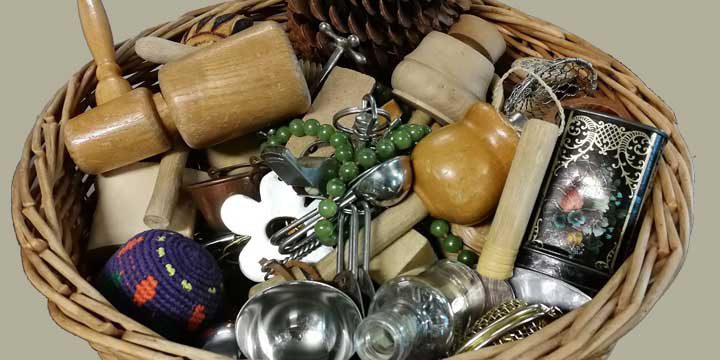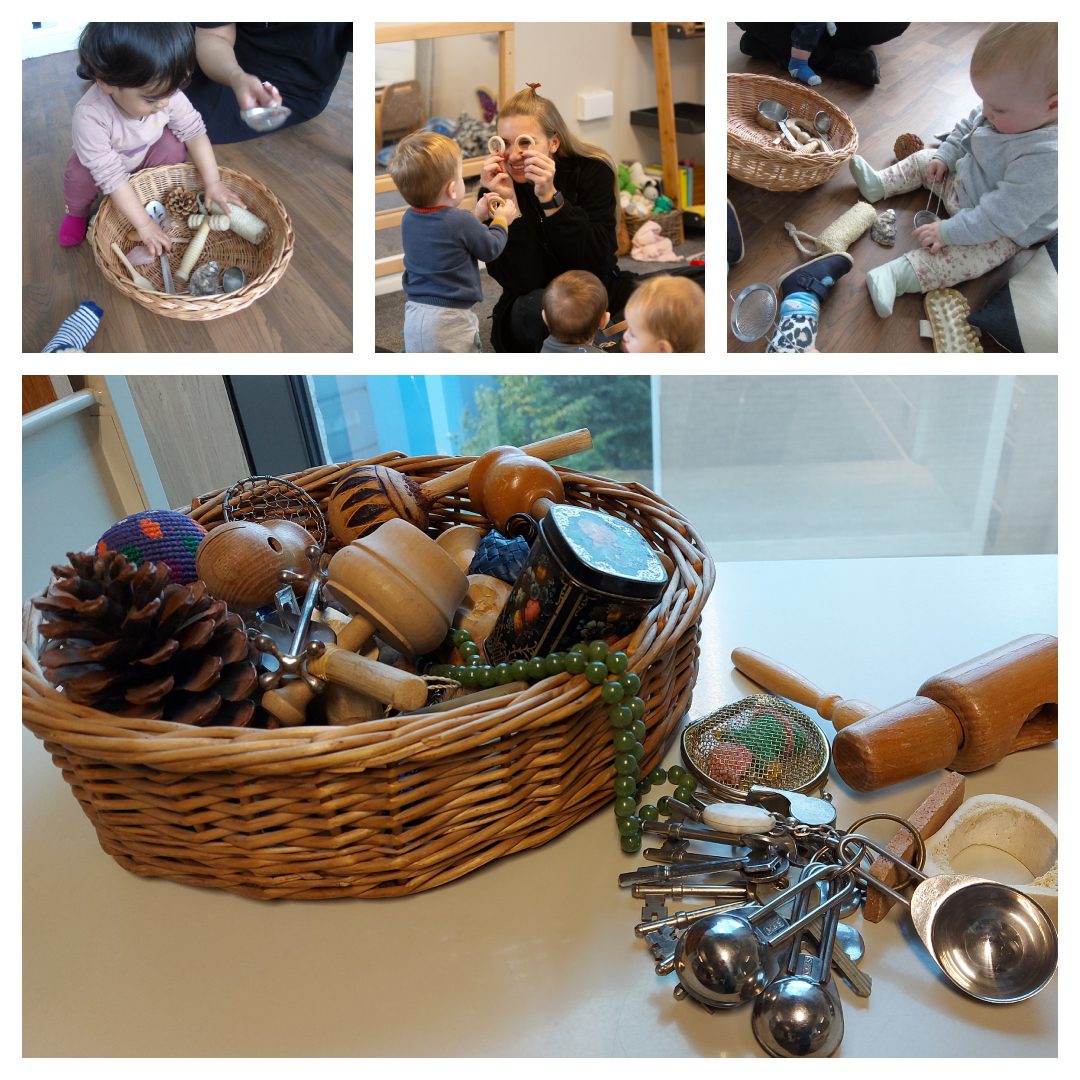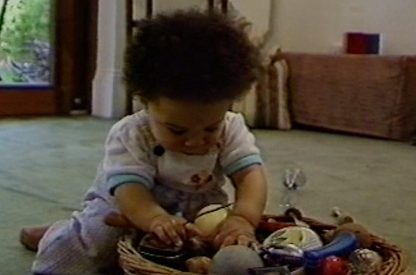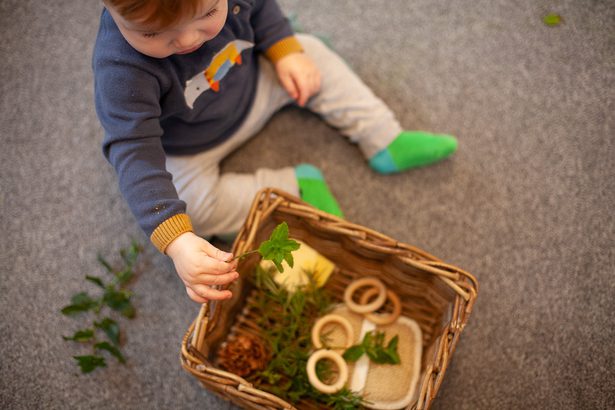Elinor Goldschmied (1910-2009) had a pioneering impact on early years policy in both the UK and internationally. Her main professional innovations included the Treasure Basket, Heuristic Play and the Key Person Approach.
Elinor Goldschmied (1910-2009) trained as both a teacher and psychiatric social worker. She was part of a long and illustrious line of early childhood educators. Her ideas, pedagogy and training style were her own - but were shaped by and developed from the Froebelian traditions of 'play as the highest form of learning in childhood' and the importance of 'cultivating creativity'.
"[Babies] suck, grasp, touch and feel objects, [rehearsing] behaviours which foster their earliest learning..."
What is The Treasure Basket?
The Treasure Basket is a collection of about 80-100 natural, household and recycled objects placed in a sturdy round wicker basket that is made available to a seated infant from about 5-10 months old.

Elinor considered that her most important contribution to our understanding of early child development was her concept of the Treasure Basket.
Treasure Baskets offer young babies a rich variety of material within reach - from which they can choose what to explore in their own way and at their own pace.

Listen to a 5 minute clip introducing Elinor Goldschmied's pioneering work with babies:
Elinor made two films about the Treasure Basket, both entitled 'Infants at Work' (1986 and 1991).
Discovered Treasure: A film on the Life and Work of Elinor Goldschmied
We are delighted to offer on loan to teaching practitioners a film about the life and work of esteemed Froebelian, Elinor Goldschmied. The film was made by the Froebel Trust in 2013

Discovered Treasure features film material which Elinor made between 1950 and 1992.
The film is available to loan (free of charge) online or as a DVD to tutors working within Early Years - HE Lecturers, FE Lecturers, teacher training tutors, social work training tutors, tutors training in counselling / psychotherapy, tutors of all child care courses and early years advisers.
To request access to the film via a protected online link or to loan a copy of the DVD please contact office@froebeltrust.org.uk
Important guidance notes for the film
Rediscovered Treasure: Elinor Goldschmied’s Treasure Basket
An article by Anita M. Hughes
The Treasure Basket is a collection of about 80-100 natural, household and recycled objects placed in a sturdy round wicker basket that is made available to a seated infant from about 5-10 months old.
At this stage all play is sensory exploration through fingers, hands and the mouth and so the greater the variety of material the greater the stimulation both for an infant’s interest and brain development.
This play is non-social and while a baby needs to be near to a key attachment figure (e.g. parent, grandparent, childminder or nursery key person) to feel safe and secure enough to be able to play, the exploration itself is done independently.
The adult’s role is to be responsive and not directive. Babies can concentrate and take pleasure from this activity for up to an hour.
Curiosity and concentration form the basis of all learning and creativity. The importance of the Treasure Basket cannot be underestimated.
The Discovery
In the spring of 2018 Elinor Goldschmied’s original Treasure Basket was discovered. It was offered on long term loan to the Froebel Trust by the Goldschmied family. It is now on display in the Foyle Special Collections room at the University of Roehampton.
Some of the items have either disappeared or perished but there are sufficient objects (about 60) to give the viewer a feel of the range and variety that Elinor collected and which babies played with.
Its first appearance with the Froebel Trust was at a conference style event entitled “Living with Children: A Gallery of Pedagogy” on the 5th April 2018 hosted by MA students in early childhood studies. Anita M Hughes was the guest speaker and talked about how Elinor had inspired her work and how they had worked together in the 1980s. At that time, although the Treasure Basket was well established as an approach in Italy and Spain, it was little known about or understood in the UK.
Elinor’s consultancy work from 1980 to the late 1990s (when she was already in her 70s and 80s) became entirely focused on teaching about the well-being and learning of infants in day care. Promoting the Treasure Basket (together with Heuristic Play and the Key Person Approach) became her real passions and she not only wrote books but also made many films.
A distillation of Elinor’s films (together with some contemporary footage) became the film entitled “Discovered Treasure”, which was created as part of a Froebel Trust project during 2011-2013. This film is now available through the Froebel Trust for training purposes.
Elinor Goldschmied (1910-2009)
Elinor was born on the 15th December 1910 into a prosperous family in rural Gloucestershire. She was the middle child of seven children and was initially educated at home. Elinor felt her early experiences of paying attention to the ‘close minutiae’ (Elinor’s words) of nature plus her freedom to play imaginatively with everyday materials in the family’s large garden informed much of her work in adult life. In an interview in 2001 she recalled, “My siblings and I spent hours of our time playing with mud, water, stones, shells and leaves; all the natural things. Every single thing became an element of interest”.
At age 12, following the death of her mother, Elinor (and her elder sister) left the family home to live with their grandfather in Bristol, where she attended Clifton High School for Girls and she subsequently became head girl. On leaving school she trained as a nursery teacher at the Froebel Institute. The ethos and approach of the Froebel training supported Elinor’s passion for nature and creativity and became the foundation for her future long and varied professional life.
In 1946 Elinor, by then a mother, went to live with her Italian husband (whom she had met in London) in Trieste. There she found work in an institution for single mothers and their babies and was profoundly influenced by the effects of emotional and mental deprivation on these babies. In an interview in 2002 she recalled, “These babies in their cots were ‘closed off’ and when I offered them an object they reached, then drew their hands back. They just couldn’t cope. Eventually they managed to pick up an object with enormous caution. I then began to look around the environment for other objects. These objects were my first collection so I did the Treasure Basket in a context…..having play material became part of the daily routine…..the staff began to have relationships with those babies too. We were able to reduce the crying and anxiety”.
In 1948 Elinor and her family moved to Milan where she worked in a newly formed institution for single mothers who were stigmatised at the time (ragazze madri) and their babies. There she was able to introduce the Treasure Basket to hundreds of babies and began teaching and training in other institutions throughout the country pioneering the transformation of childcare in Italy.
Author: Anita M. Hughes
We would like to thank Anita M. Hughes, a friend and colleague of Elinor who wrote ‘Rediscovered Treasure’ on behalf of the FroebelTrust
The Froebel Archive
A unique collection of rare books, photographs and artefacts linked to Friedrich Froebel's educational legacy.
Find out more

